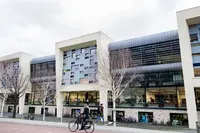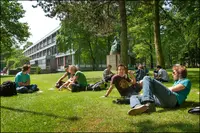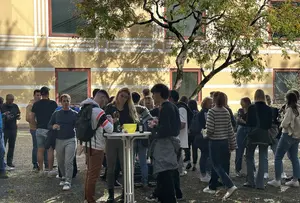In a rapidly changing world, it is crucial to understand power relations, conflicts and political developments. Students of political science will be well-positioned to analyse and solve problems of the 21st century. This dual degree programme does not only equip students with valuable research skills and theoretical underpinnings, but already educates them in an international environment. The 2-year programme allows you to study in two universities, gaining a unique perspective on global and domestic politics across a wide range of issues. In the first year of the programme you follow courses at one of the two universities and you continue your education at the other in the second year. Upon successful graduation you receive the Master of Arts in Politikwissenschaft from the University of Bamberg with specialisation in International and European Politics, Comparative Politics, Political Theory or without a specialisation as a general degree and the Master of Science in Political Science with specialisation in Comparative Politics; European Union Politics and Governance; International Relations; Political Theory; Gender Equality, Diversity and Inclusion in Politics or Conflict, Power and Politics. The programme allows the combination of two different specializations at the two universities under some circumstances.
Selectable specialisations in Bamberg:
- Comparative Politics
- International and European Politics
- Modern Political Theory
>>> Further information about Bamberg Master?s specialisations
Selectable programmes at Radboud University:
Students starting the programme in Bamberg (Bamberg = home institution)
Application and admission
If you would like to begin your studies in Bamberg (home institution), admission is always possible in the winter semester. The application for the double degree is made as part of the application for the Master's degree in Political Science and is integrated into the online application for the degree programme during the application phase. Unfortunately, we cannot accept applications from students who are already enrolled on the Master's programme. Further information about the online application procedure and the admission requirements can be found here:
>>>Application for a Master degree
Die Zugangs-Voraussetzungen für den Masterstudiengang Politikwissenschaft finden Sie hier:
>>>Application and admission: Master Political Science
Please note the shorter application deadlines for the double degree programmes: Applications for the winter semester 20254/26 will be possible from mid-May when the online portal for Master's applications opens. The application deadline ends on
22.06.2025
The following documents/evidence must be submitted for the application (in addition to the usual documents for the Master's application):
- Letter of motivation in English or German;
- Proof of English language proficiency at C1 level:
- Successfully completed a three-year Bachelor's degree programme at a Dutch university
- Successful completion of a Bachelor's degree programme taught entirely in English (in one of the following countries: EU/EEA countries, Australia, Canada (except Quebec), New Zealand, United States of America)
- TOEFL iBT: 2: 90 & subscores ≥ 22 (Home Edition will not be accepted!)
- IELTS Academic: 2: 6.5 overall. Subscores 2: 6.0, writing subscore 2: 6.5
- Cambridge C1 Advanced: Overall minimum score 176, minimum component score 169, minimum writing component score: 176
- Cambridge C2 Proficiency: Overall minimum score 180, minimum component score 169, minimum writing component score: 176
In addition to the usual recognised language certificates, school or university certificates, for example, are also accepted at the time of application. For registration at the partner university, which takes place towards the end of the first semester, an official and up-to-date language certificate must then be provided. Students register for the second year at Radboud University independently. However, they will of course also be supported by the double degree coordinator in Bamberg. Further information can be found here:
>>>Information on the application procedure (Nijmegen)
>>>Tuition fees at ther Radboud University
Enrolment for the second year at Radboud University is done by the students themselves, but of course they are accompanied by the double degree coordinator in Bamberg.
Students starting the programme in Nijmegen (Radboud University = home institution)
Admission to the second year of study
If you have started your studies at Radboud University (as your home university) and come to Bamberg for your second year of study, you will have to go through a simplified admission process. This starts with you being nominated by your home university, please then contact the Double Degree Coordinator of SoWi, Dr. Tobias Kaufmann. He will guide you through the application process in Bamberg. In addition, the International Office (IO) of the University of Bamberg will provide you with all the information you need to prepare for your academic year in Bamberg (halls of residence, introductory and language courses, etc.). Further information on these topics can also be found on the homepage of the IO:
>>>Prepare your stay in Bamberg
Unlike regular exchange students, double degree students are regularly enrolled in Bamberg. You must submit an application via the online application procedure of the Registrar's Office. You will also receive an email with all the important information and deadlines. Please wait until you are contacted by the SoWi double degree coordinator. You will then find the online application here:
There will also be an introductory event for double degrees at the SoWi at the beginning of the semester where you will have the opportunity to get to know other students who are also studying for a double degree. You will also receive a personal invitation by email.
Study programme for all DD students
The study program comprises 4 semesters. Students study at their home institution for the first two semesters and at the host university for the last two semesters. During their stay at the host university, students remain enrolled at the home institution.
The credits earned in accordance with the double degree program in Nijmegen will be credited as equivalent in Bamberg. The examination regulations for the Master's program in Political Science apply to the provision and crediting of achievements at the University of Bamberg.
>>>Study- and examination regulations of the MA Political Science
The examination regulations of Nijmegen University apply to the provision and recognition of credits at Nijmegen University.
The following overview is designed for planning and orientation, while the individual programme details result from the individual recognition agreement that students reach with the programme coordinators at both universities based on the current versions of the studying and examination rules for the underlying programmes. The courses currently offered in Bamberg are defined by the current version of the Module Handbook.
>>>Current study programme in Bamberg (Module Handbook of the MA Political Science)
Credit recognition in Bamberg
| Module group | Bamberg | Nijmegen |
|---|---|---|
| Methods in Political Science | 4 | 12 |
| Political Science Specialisation | 30 | |
| Political Science Extention | 44 | |
| Master Thesis | 12 | 18 |
| Total ECTS | 120 | |
ECTS credits for students matriculated in the Master in Political Science in Bamberg are allocated as follows:
Specialisation and Tracks
Students can choose between three options when selecting a specialization:
- They choose a similar specialization at either university:
- International Relations (RU) and Politics and Governance of the European Union (UB) for an MA degree in Political Science with a concentration in International Relations and European Politics.
- Political Theory and Political Theory for an MA degree in Political Science with a concentration in Political Theory.
- Comparative Politics and Comparative Politics for an MA degree in Political Science with a concentration in Comparative Politics.
- Students can combine their specialization at Radboud University with another specialization at Bamberg:
- To do so, four modules and the Bamberg thesis must be completed in a Bamberg specialization area.
- Students have the possibility to obtain a general degree in Bamberg without a specialization.
- To do so, they must take at least two modules from at least two focus areas other than their Radboud focus.
The following tables give an overview of the available modules for the differen option:
Methods in Political Science
The following modules must be completed in Nijmegen.
| Bamberg | Nijmegen | |
|---|---|---|
| Advanced Research Methods | 6 | |
| Sociology, Philosophy and Ethics of Research*) | 6 | |
| One of the following modules: | ||
| PWM-ME-HSl: Philosophy ofScience | 4 | |
| PWM-ME-HS2: Qualitative Methods | ||
| PWM-ME-HS3: lntroduction to Statistics for Social Science | ||
| PWM-ME-HS4: Advanced Quantitative Methods and Surveys | ||
| PWM-ME-HSS: Research Design and Causal Inference | ||
| 16 | ||
*) If not available in the RU Master ' s specialisation, the course can be replaced by one of the following: Conflict,
Transformation and Peacebuilding or Political Socialization
Specialisation
Students who chose the same specialisation at both institutions
The following specialisation can be combined:
| Radboud University | University of Bamberg |
International Relations or European Union Politics | Governance in der Europ?ischen Union |
| Political Theory | Politische Theorie |
| Comparative Politics | Vergleichende Politik |
Students who select two different specialisations
Students can combine their specialization at Radboud University with another specialization in Bamberg. This track requires students to complete four modules and the Bamberg thesis in the respective area of specialization.
Students who would like to obtain a general degree without a major in Bamberg
Students can earn a general MA degree in political science. This pathway requires students to take at least two modules from at least two concentration areas other than their Radboud concentration.
Students select one specialisation:
| Bamberg | Nijmegen | |
|---|---|---|
| Master's soecialisation in International Relations | ||
| Current Debates in International Relations Theory | 6 | |
| Cooperation and Conflict in the 21st Century | 6 | |
| Global Political Economy | 6 | |
| Internship / Elective | 6 | |
| Just War Theory | 6 | |
| Master's specialisation in Eurooean Union Politics and Govemance | ||
| The EU Executive Order | 6 | |
| Politicisation of the EU Arena | 6 | |
| Elective course / Internship | 6 | |
| EU Policy in Practice | 6 | |
| EU in Global Politics | 6 | |
| Master's specialisation in Comparative Politics | ||
| Theories of Comparative Politics: Structure, Identity and Choice | 6 | |
| Political Representation and its Challenges | 6 | |
| Elective course / Internship | 6 | |
| The Politics of Reform | 6 | |
| Deliberative Democracy | 6 | |
| Master's specialisation in Political theory | ||
| Power in Political Theory | 6 | |
| Contemporary Debates in Political Theory | 6 | |
| Elective course / Internship | 6 | |
| Deliberative Democracv or Just War Theory | 6 | |
| Urban Political Theory | 6 | |
| Master's specialisation in Conflict, Power and Politics | ||
| Conflicting Theories: Applving Theoretical Approaches of Conflict | 6 | |
| Theories of Comparative Politics: Structure, Identity and Choice | 6 | |
| International Security | 6 | |
| Internship / Elective | 6 | |
| Just War Theory | 6 | |
| Master's specialisation in Gender Equality, Diversity and Inclusion in Politics | ||
| Gender and Diversity in Organisations | 6 | |
| Power in Political Theory | 6 | |
| Political Representation and its Challenges | 6 | |
| Gender, Conflict and Security | 6 | |
| Elective course or Internship | 6 | |
Depending on which degree students are pursuing in Bamberg, they choose modules from the following focus areas.
| Bamberg | Nijmegen | |
|---|---|---|
| Master of Arts in Politicial Sciences with Specialisation in International and European Politics | ||
| PWM-IE-V: European Policy and Politis | 6 | |
| PWM-IE-HS2: International Institutions | 8 | |
| PWM-IE-HS3: European Integration | 8 | |
| PWM-IE-HS4: Foreüm and Security Policy | 8 | |
| PWM-IE-HSS: International Politics | 8 | |
| Master of Arts in Politicial Sciences with Specialisation in Political Theory | ||
| PWM-PT-V: Classics in Normative Political Theory | 6 | |
| PWM-PT-HS2: Selected Topics in Normative Political Theory | 8 | |
| PWM-PT-HS3: Selected Topics in Positive Political Theory | 8 | |
| PWM-PT-HS4: Classics in Positive Political Theorv | 8 | |
| PWM-PT-HSS: Analytic Methods in Political Theory (usually only offered in German) | 8 | |
| Master of Arts in Politicial Sciences with Specialisation in Comperative Politics | ||
| PWM-VP-V: Political Institutions | 6 | |
| PWM-VP-HS2: Methodological issues in Comparative Politics | 8 | |
| PWM-VP-HS3: Selected Topics in Comparative Politics | 8 | |
| PWM-VP-HS4: German Politics (usually only offered in German) | 8 | |
| PWM-PS-HS: Elective Module from Political Sociology | 8 | |
Masterarbeit
Students who wish to obtain a degree with a specialization in Bamberg must write their Master's thesis with the chair/professor who offers the specialization in that specialization.
| Bamberg | Nijmegen | |
|---|---|---|
| Dual Degree Thesis Bamberg | 12 | |
| Dual Degree Thesis Nijmegen | 18 |






